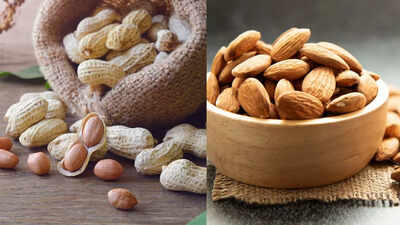Nuts are a smart snack choice for anyone looking to lose weight, providing crunch, satisfaction, and essential nutrients that fuel the body. Among the most popular nuts in India, peanuts and almonds are widely consumed for their affordability, availability, and versatility. While many assume almonds are always the healthier option, a closer look at their nutritional profiles shows that both offer unique benefits for weight management. Peanuts are protein-rich, supporting muscle repair and satiety, while almonds are higher in fiber, vitamin E, and minerals, promoting fullness and overall wellness. Understanding their differences in protein, fiber, healthy fats, and micronutrients can help you make informed choices to curb appetite, support metabolism, and achieve sustainable weight-loss results.
Nutrition profile of peanuts and almonds
A study published in the Journal of Nutritients found that eating almonds regularly, about 10–100 grams per day, can help improve blood sugar control and support healthy cholesterol levels. The research showed that almond consumption may lower total cholesterol, “bad” LDL cholesterol, and triglycerides, while potentially raising “good” HDL cholesterol. On top of this, almonds are high in fiber, which can help you feel full for longer and support weight management. Both peanuts and almonds are nutrient-dense, but their composition varies slightly, which affects how they contribute to weight loss:
- Peanuts: A 100-gram serving of raw peanuts contains approximately 23 grams of protein, 2 grams of fiber per ounce, and around 166 calories. Peanuts are rich in B vitamins, including folate and niacin, which help convert food into energy and support metabolic processes, making them ideal for active individuals trying to manage weight.
- Almonds: Almonds provide slightly less protein at 21 grams per 100 grams but are far superior in fiber, with 10.8 grams per 100 grams. They contain around 170 calories per ounce and are high in vitamin E, magnesium, calcium, and iron. These nutrients support bone health, antioxidant protection, and overall well-being, which can indirectly enhance weight-loss efforts.
While both nuts are beneficial, almonds have an edge in promoting fullness due to their higher fiber content, whereas peanuts provide slightly more protein for muscle repair and satiety.
Heart-healthy fats and weight management
Healthy fats are an important part of a weight-loss-friendly diet. Both peanuts and almonds contain mostly unsaturated fats, which are beneficial for heart health and can support long-term weight control:
- Almonds: Contain 15 grams of total fat per ounce, primarily monounsaturated fats. These fats help reduce inflammation, lower bad cholesterol levels, and support cardiovascular health, all factors that can contribute to sustained weight management.
- Peanuts: Have 14 grams of fat per ounce, with most being unsaturated. They provide similar heart-healthy benefits but contain slightly higher saturated fat, which is why portion control is essential.
Including a handful of nuts in your daily diet helps meet healthy fat requirements while keeping you satiated and preventing overeating. Nuts support weight management by boosting energy, metabolism, and overall wellness. Almonds provide vitamin E, magnesium, calcium, and iron, aiding metabolism, bone health, and reducing fatigue. Peanuts supply B vitamins like folate and niacin, supporting energy and calorie burn. Both contain zinc for immunity. Including both almonds and peanuts ensures a mix of nutrients that enhance fullness, energy, and weight-loss efforts. Regular consumption may also improve heart health, reduce inflammation, stabilise blood sugar, support brain function, and contribute to long-term metabolic and cardiovascular wellness.
How peanuts and almonds promote fullness and aid digestion
Fiber and protein are key components in managing hunger and controlling calorie intake:
- Almonds: High in fiber, almonds slow digestion and prolong feelings of fullness. This reduces the likelihood of overeating between meals and helps maintain a caloric deficit, essential for weight loss. They are also gentle on digestion when eaten raw, roasted, or soaked.
- Peanuts: Protein-rich peanuts help maintain muscle mass, promote satiety, and curb unnecessary snacking. Their nutrient profile also supports energy production, which can improve exercise performance and calorie expenditure.
Consuming nuts as snacks or adding them to meals, smoothies, or salads can help regulate appetite and prevent sudden spikes in hunger, making them ideal for a weight-loss diet.
Practical tips for including nuts in a weight-loss diet
- Stick to moderate portions, around 1–1.5 ounces per day, since nuts are calorie-dense.
- Choose raw, dry roasted, or lightly salted options. Avoid nuts with added sugar or unhealthy oils.
- Combine almonds and peanuts to get a balanced intake of protein, fiber, and micronutrients while keeping snacks interesting.
- Use nuts as part of a meal or snack rather than mindlessly eating them, ensuring they contribute to satiety and not excess calories.
Both almonds and peanuts can be highly effective in supporting weight-loss efforts, but they offer slightly different benefits. Peanuts are an excellent choice if your focus is on high protein intake and maintaining a budget-friendly diet. They provide more protein per rupee compared to almonds, which helps curb appetite, supports muscle repair, and keeps you feeling full for longer. On the other hand, almonds are ideal for those looking to increase fiber intake, boost antioxidants, and benefit from vitamin E and heart-healthy fats. These nutrients help prolong feelings of fullness, reduce inflammation, and support overall bone and heart health, making almonds a valuable addition to a balanced weight-loss diet.Disclaimer: This article is for general informational purposes only and is not a substitute for professional medical advice, diagnosis, or treatment. Always seek the guidance of a qualified healthcare provider regarding any medical condition or lifestyle change.Also Read: Endocrinologist reveals 3 ‘healthy’ breakfast foods that cause high blood sugar spikes
